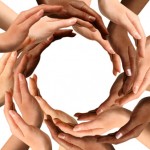Comparative Worldviews in Social Science
By Asher Crispe: December 23, 2010: Category Inspirations, Quilt of Translations
Introduction
In Kabbalah, there are three general models for the organization of social structures, all of which derive from an overarching conception of the true identity of a human being. This identity includes both the “abstract” universality and “concrete” individuality played off the positive tensions experienced by the subject caught up in the currents of political and social life. The three models that deal with the relationships of universality and individuality are referred to as worlds, since the term olam, “world,” has the connotation in Chassidic thought of a frame of reference and an optics for envisioning a certain scope of reality. The terms for these three different visions of reality are ekudim “bound,” nekudim “points,” and berudim “streaked.” Each of these worldviews can be described as social/political structures.
Collectivism

The first worldview, ekudim “bound,” refers to a situation, a reality, where the spectrum of individual details are expressed as “bound” together in one homogenized package. Thus, it reflects only universality, and there is no recognition of the particular components that go into making up the whole. More concretely, this worldview represents a pure form of social collectivism or socialism, whereby the individual is nullified in the whole of society and particular identity must always yield to the overall benefit of the whole. This outlook stems from a notion that the individual ultimately requires nothing for himself, but can be entirely disinterested to the degree that nothing but the collective matters, and everything is understood ideologically or expressed rhetorically from the standpoint of the collective.
Individualism
By contrast, the second worldview, nekudim “points,” suggests that each individual is his or her own “point” in reality. This radical individualism is purely self-centered in its intention, viewing the other as an object to be either assimilated into one’s own ongoing autobiography or to be removed as irreconcilable with one’s own authenticity. In the case of this worldview, everyone comes in his own stylized package, which is separate and distinct from everyone else, yet there is no true sense of inter-subjective integration. As a model social structure, it is understood to resemble a pure form of capitalism. Here one tries to amass as much as possible for himself. One person is in constant competition with another and in a ceaseless pursuit of fame and fortune. One feels that he must challenge and imitate the other. The phrase in Kabbalah for this kind of highly individualistic social vision is related in the description of the Kings of Edom in the Torah, of which it is said regarding each of them (except the last) that, “He ruled and then he died.” According to Kabbalah, these kings represent the chaotic world of “points” which is fundamentally unstable due to the lack of integration of its diverse forces. So, too, individuals exert their authority, come into power, wealth and success, and then fall and are swallowed by the next generations or close competitors, hence they die, disappearing from the scene where they, for a time at least, possessed the center stage.
resemble a pure form of capitalism. Here one tries to amass as much as possible for himself. One person is in constant competition with another and in a ceaseless pursuit of fame and fortune. One feels that he must challenge and imitate the other. The phrase in Kabbalah for this kind of highly individualistic social vision is related in the description of the Kings of Edom in the Torah, of which it is said regarding each of them (except the last) that, “He ruled and then he died.” According to Kabbalah, these kings represent the chaotic world of “points” which is fundamentally unstable due to the lack of integration of its diverse forces. So, too, individuals exert their authority, come into power, wealth and success, and then fall and are swallowed by the next generations or close competitors, hence they die, disappearing from the scene where they, for a time at least, possessed the center stage.
Torah
The third worldview, which could be called the Torah perspective, is the world of birudim “streaked”. What is implied in the word birudim is that there is a semblance of both individual points, as well as lines that connect them, streaked from one to another. In other words, it combines positive aspects of the two previous worlds. Therefore, it is sometimes referred to as the world of rectification—that which carries with it the promise of continual improvement—working within human limitations while aided by  Divine assistance. What is paradoxical about this worldview is that it combines opposites simultaneously suggesting that a social structure requires both collectivism and individuality simultaneously. Now, what is unique in the incorporation of collectivity and individuality in this view, rests upon the insistence that any third alternative would not simply become a synthesis or diluting of the pure states of the other two. What Kabbalah is suggesting here is not a compromised shade of gray, but rather the integration of opposites as opposites simultaneously. The accomplishment of this rectified position requires a person to know his place, to being content with his portion, to realizing that all he has is derived from G-d, and therefore, become naturally inclined to offer his gifts, talents, and abilities towards a unique, irreplaceable contribution to society. In short, I know that I have what is mine for the sake of exercising my responsibility and benefiting others. My responsibility is uniquely mine. Hence, our situation could not be described as collectivism, for each individual plays an essential role as an individual and is recognized as such. Nor can this be described as individualism, for nothing that I possess or exercise sovereignty over is solely for myself, but is always given to me so that I may vigilantly employ it for others, for the collective. Moreover, there is no sense in which I remain frozen in my solitude as an individual, but am continually delivered into a social relationship via my contact with the other, and therefore, play a part in the collective identity as well.
Divine assistance. What is paradoxical about this worldview is that it combines opposites simultaneously suggesting that a social structure requires both collectivism and individuality simultaneously. Now, what is unique in the incorporation of collectivity and individuality in this view, rests upon the insistence that any third alternative would not simply become a synthesis or diluting of the pure states of the other two. What Kabbalah is suggesting here is not a compromised shade of gray, but rather the integration of opposites as opposites simultaneously. The accomplishment of this rectified position requires a person to know his place, to being content with his portion, to realizing that all he has is derived from G-d, and therefore, become naturally inclined to offer his gifts, talents, and abilities towards a unique, irreplaceable contribution to society. In short, I know that I have what is mine for the sake of exercising my responsibility and benefiting others. My responsibility is uniquely mine. Hence, our situation could not be described as collectivism, for each individual plays an essential role as an individual and is recognized as such. Nor can this be described as individualism, for nothing that I possess or exercise sovereignty over is solely for myself, but is always given to me so that I may vigilantly employ it for others, for the collective. Moreover, there is no sense in which I remain frozen in my solitude as an individual, but am continually delivered into a social relationship via my contact with the other, and therefore, play a part in the collective identity as well.
*Based in part on the essay Sheloshah Olahmot by Rabbi Yitzchak Ginsburgh
Comparative Worldviews in Social Science,













;)
;)
;)
;)
;)
;)
;)
;)
;)
;)

View it as the capitalist world contributing to the society as a whole… like people and/or companies that makes big fortunes/profits and donate, etc. for the well being of as many as possible…
In my opinion, viewing the ideal societal paradigm Birudim through the inherently flawed lens of capitalist economic practice is both oxymoronic and nominal;resulting almost invariably in myriad forms of social and political distortion,injustice, and deviance from the normative behavioral and moral code as proscribed by Torah.
The primary flaw inherent in capitalist economic doctrine is its’ immense capacity to allow man’s inclination toward evil,that certain proclivity towards selfishness,too run rampant and unchecked…deliberately “missing the mark” (e.g. monopolies of money/political power by individual/corporate entities who elevate themselves in a parody of G-d through their wicked subjugation/abuse/explotation of humanity/planetary life,according to their lusts).
Andre,as you have pointed out, capitalism, when employed to serve yatser hatov, can and does help empower certain aspects of society, thereby arguably benefitting the whole.However, it is , in most cases, arbitrarily applied according to the peculiar preferences and personal prejudices of the source,thereby potentially (albeit,inadvertently)feeding/ reinforcing yetser hara,and once again “missing the mark”.
It is my belief that capitalism is most effectively employed as a tool;used ONLY to implement(not maintain) a transition from our current social and economic policies into a society that embraces Birudim as its’ fundamental foundational structure.Thus, it is only through the pure performance of avodah(primarily in its’ sacrificial aspect), in a collective refusal to cooperate with yatser hara, that we can create the ground for Birudim to manifest in its’ truest form.